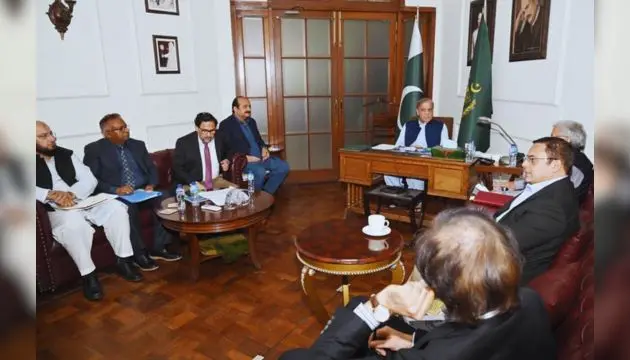ISLAMABAD: Prime Minister Shehbaz Sharif directed to finalize the National Electric Vehicles (NEV) Policy 2025 after consulting all stakeholders and present it promptly to the federal cabinet.
According to the details, the NEV policy offers subsidies, including Rs50,000 for electric motorcycles and Rs200,000 for rickshaws, totaling Rs4 billion. It also supports the establishment of electric vehicle (EV) infrastructure such as charging stations.
The Prime Minister gave these instructions during a high-level meeting today to review the policy framework.
“Pakistan needs urgent measures to promote electric motorcycles, scooters, three-wheelers, cars, and buses,” emphasized PM Shehbaz. He stressed the importance of developing charging infrastructure, including stations and battery swapping facilities, to expand the EV ecosystem.
“We must support relevant industries to enhance local manufacturing of electric two-wheelers and three-wheelers,” added the PM.
The meeting was attended by Federal Ministers Rana Tanveer Hussain, Ahmad Khan Cheema, Muhammad Aurangzeb, Special Assistant Haroon Akhtar, and other senior government officials.
— ALSO READ —
PPP may not support federal budget if solar panel tax remains: Murad Ali Shah
Earlier this week, 57 manufacturers were licensed to produce EVs, benefiting from fiscal incentives, tax exemptions, and reduced charging tariffs under the government’s ‘Clean Green Pakistan’ and ‘Make in Pakistan’ initiatives.
In another development, the Sindh government decided on June 11 to procure more buses and allocate funds for EV taxis and scooters in the upcoming fiscal year 2025-26.
This decision was taken in a meeting chaired by Transport and Mass Transit Minister Sharjeel Inam Memon, where projects like the People’s Bus Service and EV scooters were reviewed.
Meanwhile, former Federal Minister and senior PML-N leader Khawaja Saad Rafique met with Prime Minister Muhammad Shehbaz Sharif.
During the meeting, Khawaja Saad Rafique praised the Prime Minister for presenting a public-friendly federal budget, calling it a positive step towards economic stability and relief for the people.
The leaders also discussed the current political situation in detail, reaffirming their commitment to addressing national challenges through unity and democratic dialogue.
In a related development, Deputy Prime Minister and Foreign Minister Ishaq Dar reviewed preparations for the upcoming 12th session of the Pakistan-UAE Joint Ministerial Commission (JMC) in Abu Dhabi, according to a statement from the Foreign Office.
The 12th session follows a hiatus of 13 years since its last scheduled meeting in October 2024. The 11th session took place in Islamabad in November 2013.
— ALSO READ —
No tax on Rs50,000 cash withdrawals — FBR sets new Rs75,000 limit for non-filers
“Dar chaired a high-level meeting to advance key bilateral initiatives, formalize collaboration in existing sectors, explore new avenues for cooperation, and attract mutually beneficial UAE investments,” the FO statement said.
“The deputy prime minister reiterated Pakistan’s firm commitment to strengthening economic and trade relations with the UAE.”
The meeting was attended by federal secretaries and senior officials from relevant ministries and departments, along with Special Assistant Tariq Bajwa.
The UAE is Pakistan’s third-largest trading partner, hosting over a million Pakistani expatriates and being the second-largest source of remittances after Saudi Arabia.
Pakistan’s Ambassador to the UAE Faisal Tirmizi reported that bilateral trade exceeded US\$10.9 billion in FY 2023–24, including goods and services.
He noted that Pakistani remittances from the UAE totaled \$6.7 billion in 2024, with goods trade increasing by 21.63% from July 2024 to January 2025, including a 7.53% rise in exports, indicating sustained economic engagement.











